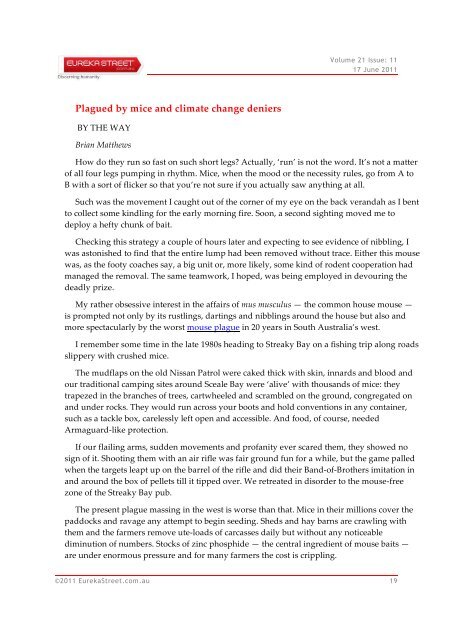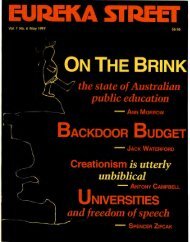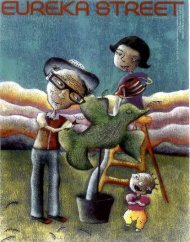17 June 2011 Volume: 21 Issue: 11 Australia's ... - Eureka Street
17 June 2011 Volume: 21 Issue: 11 Australia's ... - Eureka Street
17 June 2011 Volume: 21 Issue: 11 Australia's ... - Eureka Street
Create successful ePaper yourself
Turn your PDF publications into a flip-book with our unique Google optimized e-Paper software.
<strong>Volume</strong> <strong>21</strong> <strong>Issue</strong>: <strong>11</strong><strong>17</strong> <strong>June</strong> <strong>20<strong>11</strong></strong>Plagued by mice and climate change deniersBY THE WAYBrian MatthewsHow do they run so fast on such short legs? Actually, ‘run’ is not the word. It’s not a matterof all four legs pumping in rhythm. Mice, when the mood or the necessity rules, go from A toB with a sort of flicker so that you’re not sure if you actually saw anything at all.Such was the movement I caught out of the corner of my eye on the back verandah as I bentto collect some kindling for the early morning fire. Soon, a second sighting moved me todeploy a hefty chunk of bait.Checking this strategy a couple of hours later and expecting to see evidence of nibbling, Iwas astonished to find that the entire lump had been removed without trace. Either this mousewas, as the footy coaches say, a big unit or, more likely, some kind of rodent cooperation hadmanaged the removal. The same teamwork, I hoped, was being employed in devouring thedeadly prize.My rather obsessive interest in the affairs of mus musculus — the common house mouse —is prompted not only by its rustlings, dartings and nibblings around the house but also andmore spectacularly by the worst mouse plague in 20 years in South Australia’s west.I remember some time in the late 1980s heading to Streaky Bay on a fishing trip along roadsslippery with crushed mice.The mudflaps on the old Nissan Patrol were caked thick with skin, innards and blood andour traditional camping sites around Sceale Bay were ‘alive’ with thousands of mice: theytrapezed in the branches of trees, cartwheeled and scrambled on the ground, congregated onand under rocks. They would run across your boots and hold conventions in any container,such as a tackle box, carelessly left open and accessible. And food, of course, neededArmaguard-like protection.If our flailing arms, sudden movements and profanity ever scared them, they showed nosign of it. Shooting them with an air rifle was fair ground fun for a while, but the game palledwhen the targets leapt up on the barrel of the rifle and did their Band-of-Brothers imitation inand around the box of pellets till it tipped over. We retreated in disorder to the mouse-freezone of the Streaky Bay pub.The present plague massing in the west is worse than that. Mice in their millions cover thepaddocks and ravage any attempt to begin seeding. Sheds and hay barns are crawling withthem and the farmers remove ute-loads of carcasses daily but without any noticeablediminution of numbers. Stocks of zinc phosphide — the central ingredient of mouse baits —are under enormous pressure and for many farmers the cost is crippling.©<strong>20<strong>11</strong></strong> <strong>Eureka</strong><strong>Street</strong>.com.au 19
















